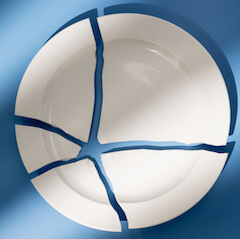Turning broken dishes into highways might seem like an unlikely operation, but at Maritim Hotels, it’s very much in keeping with the company’s long history of green initiatives.
The initiative, which began 18 months ago, was a no-brainer, according to Mark Spivey, director of international sales at Maritim Hotels. Approximately 3 percent of the hotel chain’s tableware supply goes into what he terms “breakage” — either through accidents, natural stains, or chippage from dishwasher use — and is now being recycled.
“With 34 hotels in Germany, and with all the events that we do and especially outside catering, you are bound to get chipped glasses, you are bound to get chipped crockery,” Spivey said.
Maritim works with Remondis, a global recycling, services, and water company, to collect the broken dishes to be recycled. The Remondis Lippe Plant in Lünen, Germany, which is the largest industrial recycling center in Europe, receives more than 1.6 million tons of scrap, which is ultimately transformed into more than 1 million tons of usable raw material and products, including asphalt.
In addition to recycling broken dishes, the hotel chain also sends food waste to local farms as compost, and partners with farmers to develop farm-to-table menu options for hotels.
Spivey noted that besides conserving resources, there’s another important reason why having a green footprint is needed — it’s regularly a guest requirement. Maritim Hotels’ Green Meetings offerings includes fair-trade tea and coffee, lunches and buffets made with locally sourced ingredients, and recyclable products.


